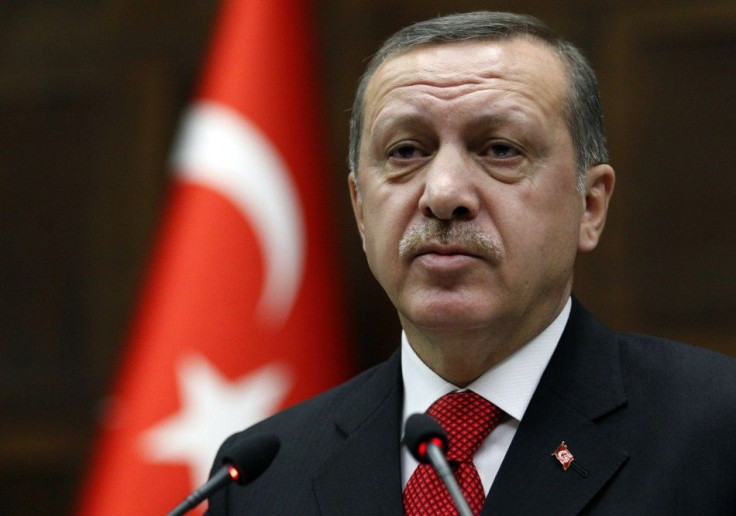Turkey’s PM Erdogan: Constitutional Reformer Or Imminent Dictator?

The leader of Turkey’s principal opposition party has blasted Prime Minister Recep Tayyip Erdogan as an “elected dictator” who is perpetrating a constitutional crisis in order to gain sweeping powers in one of the Muslim world’s most economically successful democracies.
Speaking to the Guardian newspaper of Britain, Kemal Kilicdaroglu, the chairman of the Republican People's Party, or CHP, warned that Erdogan, who has ruled Turkey since 2002 under the Islamist Justice and Development Party, or AKP, seeks to return to power as president following elections scheduled to be held next year.
"Turkey needs a new constitution to protect individual rights," Kilicdaroglu said.
"The prime minister is more and more authoritarian, unfortunately. The sovereignty of fear is ubiquitous. No one can talk with ease on the telephone. Civil society is under pressure. The universities cannot express their view. The labor unions are completely silent.”
Under Erdogan’s reign, Turkey has been transformed into a regional and economic power, with expanding influence in foreign policy and a higher profile in global affairs. But Kilicdaroglu alleges all these advancements have come at a steep price.
"There is not one single dissenting voice within [Erdogan’s] own party,” the CHP leader stated. “The attempt to create an executive presidency is all about the concentration of power in a single hand. It will be a disaster for Turkey. It will cancel all the democratic gains Turkey has made."
This matter will become of crucial importance next month when Erdogan and AKP said they will take their own constitutional draft directly to referendum, leading to charges by the opposition that the new constitution will heavily reflect AKP’s conservative values.
The current Turkish constitution was put in place more than three decades ago in 1982 by a military junta that toppled the government in 1980. Due to its authoritarian nature, the constitution needs to be amended to accommodate significant political and civil changes in the country.
But the AKP’s proposed reforms to the constitution includes a presidential system that would submit the legislature to the executive branch.
With the AKP holding 326 [out of 557] seats in parliament, AKP needs a maximum of 367 [two-thirds] to push for a referendum. To reach that threshold, Erdogan needs some support from rival parties.
Erdogan recently told a meeting of his parliamentary deputies: “We are hoping that this matter will be finalized by the end of March. ... If it is not completed, the AK Party will bring its work on this to parliament's agenda. ... When we have the power to hold a referendum, we will go to the nation."
In a bid to gain the support of other parties for a referendum, Erdogan has even sought a deal of sorts with the Peace and Democracy Party, or BDP, a pro-Kurdish entity (despite the fact that Erdogan’s government has imprisoned hundreds of BDP members and supporters under the auspices of anti-terrorism).
Opponents of Erdogan on both the left and right have condemned Erdogan for making such an overture to the Kurds purely for political purposes.
Kilicdaroglu also complained about the persecution of journalists in his country.
"When the press is not free, the people are not free," he said. "Whether this is a healthy environment in which to frame a new constitution is a matter I leave to you to decide."
Kadri Gürsel, a Turkish columnist, went even further in his criticism of Erdogan, accusing the prime minister of seeking to establish an “elected sultan regime.”
Writing in Al-Monitor, Gursel declared: “It has long been known that ... Erdogan aspires to abolish Turkey’s parliamentarian regime, shift to a presidential system and become its first president. ... The proposed [AKP] constitution stipulates that elections for the single-chamber legislative assembly and the president, who holds the executive power, will be held on the same day. The clause is designed to ensure that the political tendency of the voters shapes simultaneously both parliament and the presidency and that both elections eventually produce the same political outcome. As a result, the room for checks and balances between the legislative and executive powers is restricted from the very start.”
Gursel also warned that under the AKP proposals, the president would be granted “extraordinary” powers, including the right to dissolve parliament, call parliamentary and presidential elections and govern the country through presidential decrees irrespective of legislative processes.
“Under the proposal, the president holds such extensive powers over parliament that the presidency is capable of blocking virtually any legislation,” he added.
“If the president is unhappy with a given bill and returns it to parliament, the legislature can pass the bill unchanged and send it back for ratification only with a three-fifths majority. A simple majority is enough for the procedure under the current constitution. ... If this proposal becomes Turkey’s new constitution, Turkey will no longer be a democracy.”
© Copyright IBTimes 2024. All rights reserved.




















